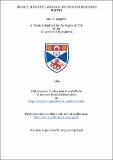France, man and language in French Resistance poetry.
Abstract
The Second World War witnessed what was recognised at the time as a poetic revival in France. The phenomenon of Resistance poetry in particular commanded literary attention throughout the war. Immediately afterwards, however, this large corpus of poetry was widely dismissed as an unfortunate aberration. Viewed as ephemeral poetry of circumstance with only a documentary value, as tendentious poésie engagée, as propaganda or as conservative patriotic verse, it was thought unworthy of consideration as poetry. Marked by the reputation it gained just after the war, Resistance poetry has been given short shrift in critical studies, and has only rarely been the focus of academic attention. This study reexpounds in detail and with a wide range of reference the debate concerning Resistance poetry, and draws attention to a number of poets who are not widely known, or who are not known as Resistance poets. It demonstrates through a thematic and formal analysis of a selection of Resistance poetry that it is in fact no different from poetry as implicitly understood by critics who have dismissed it. A description of commitment in Resistance poetry is followed by a thematic study of its three related objects, namely France, man and language. Detailed examinations of these three major concerns in the poetry challenge the received view that Resistance poetry is conservative in its patriotism, dogmatic or essentialist in its commitment, and reactionary in its use of language. This thematic study is complemented by illustrative analyses of individual poems or parts of poems, and by a concluding commentary.
Type
Thesis, PhD Doctor of Philosophy
Collections
Items in the St Andrews Research Repository are protected by copyright, with all rights reserved, unless otherwise indicated.

